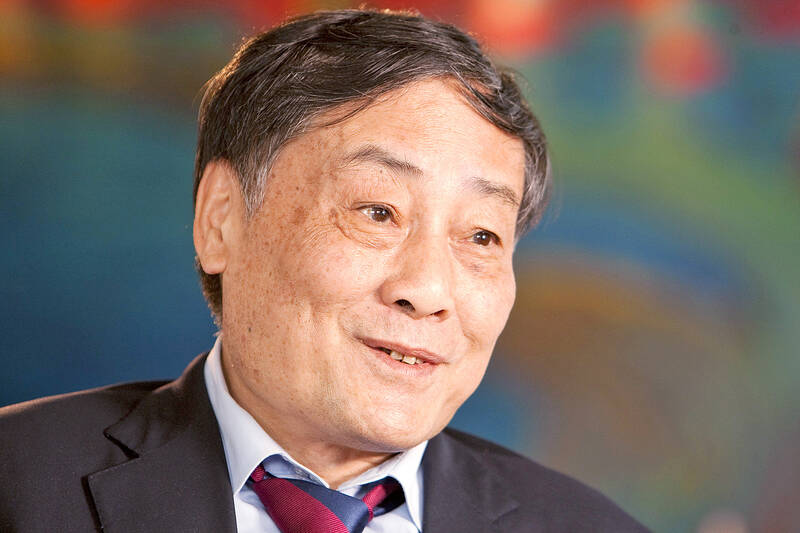Chinese business magnate Zong Qinghou (宗慶后), whose leading beverage firm once made him the richest person in the country, died yesterday, his company said.
He was 79.
Zong was the founder of the Wahaha Group Co (娃哈哈集團), which specializes in bottled water, soft drinks, tea and other products.

Photo: Bloomberg
He died yesterday morning after “treatment for an illness proved ineffective,” the company said in an obituary on a Chinese microblogging site.
A memorial service for Zong is to be held on Wednesday at the company’s offices in the eastern city of Hangzhou, the statement said.
Chinese state media reported last week that Zong was receiving hospital treatment, but gave no details of his illness.
Zong went into business in his 40s, selling soft drinks to children and reportedly being so short of cash that he slept under a bridge in Beijing because he could not afford a hotel.
He established Wahaha in 1987 and built it into a beverage giant whose drinks are a fixture in shops and kiosks across China.
In 2010, Zong was listed by Forbes magazine as China’s richest person with a US$8 billion fortune.
Its estimate last year put him in 53rd place nationally with a net worth of US$5.9 billion.
The tycoon previously voiced support for lowering taxes as a strategy for boosting investment, telling reporters in 2013 that China’s growing wealth inequality was not a problem.
“If we had egalitarianism... we wouldn’t have enough to eat,” Zong said at the time. “It’s best to encourage people to create wealth.”
In recent years, Wahaha — whose name means “Laughing Child” in Chinese — has branched out into various other sectors including baby milk and clothing.
In 2021, Zong took a step back from frontline work, appointing his daughter Zong Fuli (宗馥莉), also known as Kelly Zong, as Wahaha’s vice chairperson and president.

Nvidia Corp chief executive officer Jensen Huang (黃仁勳) on Monday introduced the company’s latest supercomputer platform, featuring six new chips made by Taiwan Semiconductor Manufacturing Co (TSMC, 台積電), saying that it is now “in full production.” “If Vera Rubin is going to be in time for this year, it must be in production by now, and so, today I can tell you that Vera Rubin is in full production,” Huang said during his keynote speech at CES in Las Vegas. The rollout of six concurrent chips for Vera Rubin — the company’s next-generation artificial intelligence (AI) computing platform — marks a strategic

REVENUE PERFORMANCE: Cloud and network products, and electronic components saw strong increases, while smart consumer electronics and computing products fell Hon Hai Precision Industry Co (鴻海精密) yesterday posted 26.51 percent quarterly growth in revenue for last quarter to NT$2.6 trillion (US$82.44 billion), the strongest on record for the period and above expectations, but the company forecast a slight revenue dip this quarter due to seasonal factors. On an annual basis, revenue last quarter grew 22.07 percent, the company said. Analysts on average estimated about NT$2.4 trillion increase. Hon Hai, which assembles servers for Nvidia Corp and iPhones for Apple Inc, is expanding its capacity in the US, adding artificial intelligence (AI) server production in Wisconsin and Texas, where it operates established campuses. This

Garment maker Makalot Industrial Co (聚陽) yesterday reported lower-than-expected fourth-quarter revenue of NT$7.93 billion (US$251.44 million), down 9.48 percent from NT$8.76 billion a year earlier. On a quarterly basis, revenue fell 10.83 percent from NT$8.89 billion, company data showed. The figure was also lower than market expectations of NT$8.05 billion, according to data compiled by Yuanta Securities Investment and Consulting Co (元大投顧), which had projected NT$8.22 billion. Makalot’s revenue this quarter would likely increase by a mid-teens percentage as the industry is entering its high season, Yuanta said. Overall, Makalot’s revenue last year totaled NT$34.43 billion, down 3.08 percent from its record NT$35.52

PRECEDENTED TIMES: In news that surely does not shock, AI and tech exports drove a banner for exports last year as Taiwan’s economic growth experienced a flood tide Taiwan’s exports delivered a blockbuster finish to last year with last month’s shipments rising at the second-highest pace on record as demand for artificial intelligence (AI) hardware and advanced computing remained strong, the Ministry of Finance said yesterday. Exports surged 43.4 percent from a year earlier to US$62.48 billion last month, extending growth to 26 consecutive months. Imports climbed 14.9 percent to US$43.04 billion, the second-highest monthly level historically, resulting in a trade surplus of US$19.43 billion — more than double that of the year before. Department of Statistics Director-General Beatrice Tsai (蔡美娜) described the performance as “surprisingly outstanding,” forecasting export growth